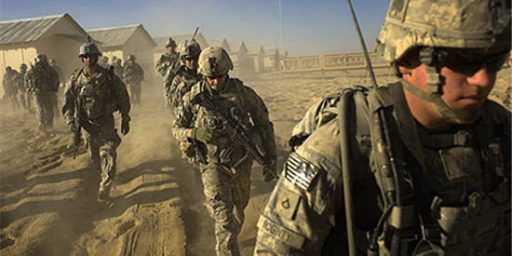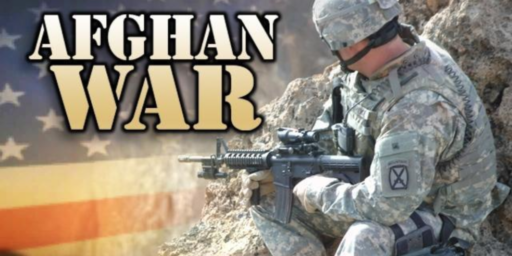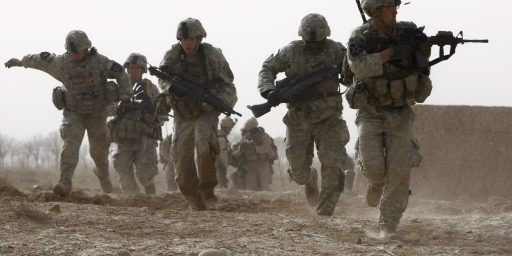Obama To Announce Afghan Troop Withdrawal
During tonight’s State of the Union Address, President Obama will announce that half of the American troops currently in Afghanistan will be home in a year:
WASHINGTON — President Obama plans to announce in his State of Union address on Tuesday night that half of the 66,000 American troops in Afghanistan will be home by this time next year, according to an administration official familiar with the speech.
The decision by Mr. Obama represents a careful balancing of political interests and military requirements. The announcement enables him to say that slightly more than half of the American force — 34,000 troops — will be out of Afghanistan by next February, keeping on track a plan to hand over security responsibility to Afghan troops by the end of 2014.
But the plan also gives the military commanders in Afghanistan the flexibility they have long sought in determining the pace of the reductions. Under the phased withdrawal, this official said, commanders will have a “robust force” for the next fighting season, which ends in September and October.
The commanders want to hold on to sufficient forces — including troops, airpower and medical evacuation units — to support the Afghan troops during this transition. They also want to try to consolidate military gains before rapidly drawing down American forces.
At the same time, the official said, the pace of the drawdown will be rapid enough that it will prod Afghan forces to take on greater responsibility for securing the country. The danger of leaving too many American troops for too long, he said, is that the security situation could “go off a cliff” after the United States largely withdraws.
Afghan troops are scheduled to move into a lead role this spring, under an accelerated transition of security responsibility that Mr. Obama announced when President Hamid Karzai of Afghanistan visited Washington last month. Mr. Obama planned to call Mr. Karzai later on Tuesday morning to inform him of the planned announcement.
Things certainly do seem to be moving forward toward a withdrawal by the end of the 2014. The only remaining question is the size of any residual force that many be left behind. Estimates of such a force have ranged anywhere from 5,000 to 30,000 troops, but I suspect that, if such a force does remain, it’s going to be on the smaller side of that estimate.





The headline had me wondering where the Afghans were going to go, but it’s clear now that they drew the short straw and have to stay. Now that we’re playing out the final few acts of this current revival of the traditional Afghan play, who is the favorite to produce the next performance? Which country is showing the optimism and lack of historical perspective needed to try to make this star-crossed script a success?
@John H:
It won’t be the Chinese. They know all too well the old saw about not being able to buy an Afghan, but sure being able to rent one.
@John H:
Please don’t give them any ideas.
Tom Ricks has a series of great posts that concentrate on the impossibility of pulling off counterinsurgency operations in someone else’s country on the other side of the world. One of Ricks’ authors pointed out the the consistency with which we fail at these operations, the exception proving the rule being the Philippines where it was at the time a part of our country (and we were loved). The posts are at http://ricks.foreignpolicy.com/
And within 10 years Afghanistan will be run by local warlords with the central gov’t only running a few major cities.
I strongly suspect that there will be a lot of people, including you, Doug, who will be disappointed at the number of troops we have in Afghanistan in ten years time. IMO we’ll keep something in the middle to high end of the range you’ve suggested and whatever the nominal role of that force, it will have combat capabilities.
Mike:
You’ve described Afghanistan now. The central government doesn’t have much control outside of Kabul.
@Dave Schuler: You are correct. They never did in the past either. The difference is that we and other countries have kept the warlords (somewhat) in check. When we leave, they will have free reign again.
The Taliban actually managed to subdue or expel most of the warlords by 2001. In terms of exerting control over the the country, they were the most effective government Afghanistan had since 1992. I don’t see why it’s considered impossible for them or some other local force to take control over the country again.
@Doug. Isn’t it great that we are talking about President Obama announcing troop withdrawals rather than President Romney talking about our need to recommit to victory in Afghanistan with new troop deployments?
@Sejanus: Dostum? Northern Alliance?
@Mike: Notice I said “most” of the warlords, not all of them. By September 2001 militias opposed to the Taliban controlled less than 10% of the country, and I’m guessing the Taliban would have eventually conquered that too had the US didn’t invade.
@Mike:
As it has been. As it will be.
Kipling wasn’t just making shit up out of whole cloth.
In 1839, the reigning global superpower went into Afghanistan with high hopes and overwhelming force, and quickly installed a government of its choice.
This is how their army ended up, and this is a picture of the one person ( out of 17,500) who made it back to tell the tale.
We can say we did better than those guys, but not a whole heck of a lot better, in terms of strategy in the long run.
I have to agree with Dave Schuler, though. Logistics demands that we are going to have to have some kind of long term land presence in the area, so our sojourn in Southwest Asia will continue somwhere, some how.